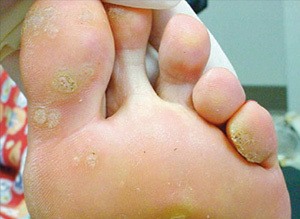No products in the cart.
Podiatry
Those painful lumps on the bottom of your foot: Are they Corns or Verrucae?
Those painful lumps on the bottom of your foot: Are they Corns or Verrucae?
If you have a small, round lump on the bottom of your foot, then there’s a good chance you’ve already discovered that it’s likely to be either a corn or a verruca. Perhaps you’ve had one of them before. Both are small, round and may or may not be painful on walking. You may have many of them, or just one. Their appearance and presentation can be so similar that even health professionals still get them confused, yet the treatment and the cause couldn’t be more different. So, how do you tell? Here are some tips on how to tell them apart from our expert Podiatrists!
Corns
There are two types of corns: a soft corn and a hard corn. The most common type of corn is a hard corn and is medically referred to as Heloma Durum. Essentially, a hard corn is a build up of hard skin, but unlike standard callus which forms in larger areas on the outside of the foot, corns have a conical shape that protrudes beneath the surface layer of the foot at a precise location. Hence, it appears circular at the surface of the foot. Corns will be painful by direct pressure onto the lesion, that is, pushing directly down onto it. This may or may not irritate the surrounding skin, causing redness or minor inflammation. Often they feel like you are walking on a pebble.
Hard corns occur directly as a result of a high area of pressure at a certain location, often when a prominent bone rubs or presses against a shoe or surface. This is why corns often occur beneath prominent joints or on the sides of the 1st and 5th toes. If the top layer of skin is removed from a corn, there shouldn’t be much pain or any bleeding, unless the healthy, surrounding skin has been irritated in the process. Corns can occur at any age, but due to their mechanical nature are often associated with high levels of activity. Corns are not contagious.
Verrucae
A verruca is more commonly referred to as a wart and is caused by the Human Papilloma Virus (HPV). As a virus, it is very contagious and once you contract it, it will always be in your system. Warts have a large tendency to be contracted at a young age, and can come and go at any time throughout your life. Warts can appear anywhere on the feet, with the most common areas being the ball of the foot and the heel, and often (though not always) appear in clusters.
The round surface of the wart may appear dry or crusty, with black dots observed throughout. This is unlike corns, that tend to have more of a thick and smooth surface. Pain may be elicited by pushing down on the wart, but the pain is almost always felt when squeezing or pinching the wart from the sides. Corns don’t often elicit this same pain on pinching unless you’re pinching the sensitive skin surrounding the corn.
Treatment
Treatment for corns and warts differs greatly. Corns can be quickly and painfully enucleated, with the conical core removed by a specially trained Podiatrist. This will give you instant relief. More than that, your Podiatrist will help you identify the cause of your corn to reduce the risk of it developing again.
Verrucae are much trickier. There are many treatment options available, ranging from silver nitrate all the way to surgery. Your Podiatrist will determine your best course of action after examining your verrucae and talking through your options.
We recommend against using at-home treatments, as a number of them use acids which when accidentally applied to the surrounding healthy tissue can cause it to become damaged and macerate.
The first step is getting your feet checked to determine whether you’re dealing with a corn or a wart (or in the odd case something completely different!). Both corns and verrucae can quickly become very painful to walk on and start impairing your day-to-day life and your ability to do the things you love.
Thankfully, you don’t have to put up with the pain. Our expert team here at Footcare Specialist Podiatrist is proud to be caring for our local community and delivering excellent Podiatry services with fantastic results. If you’ve got any concerns about your feet or are experiencing any pain, give us a call on 09 214 9585 – we’re here to help!
